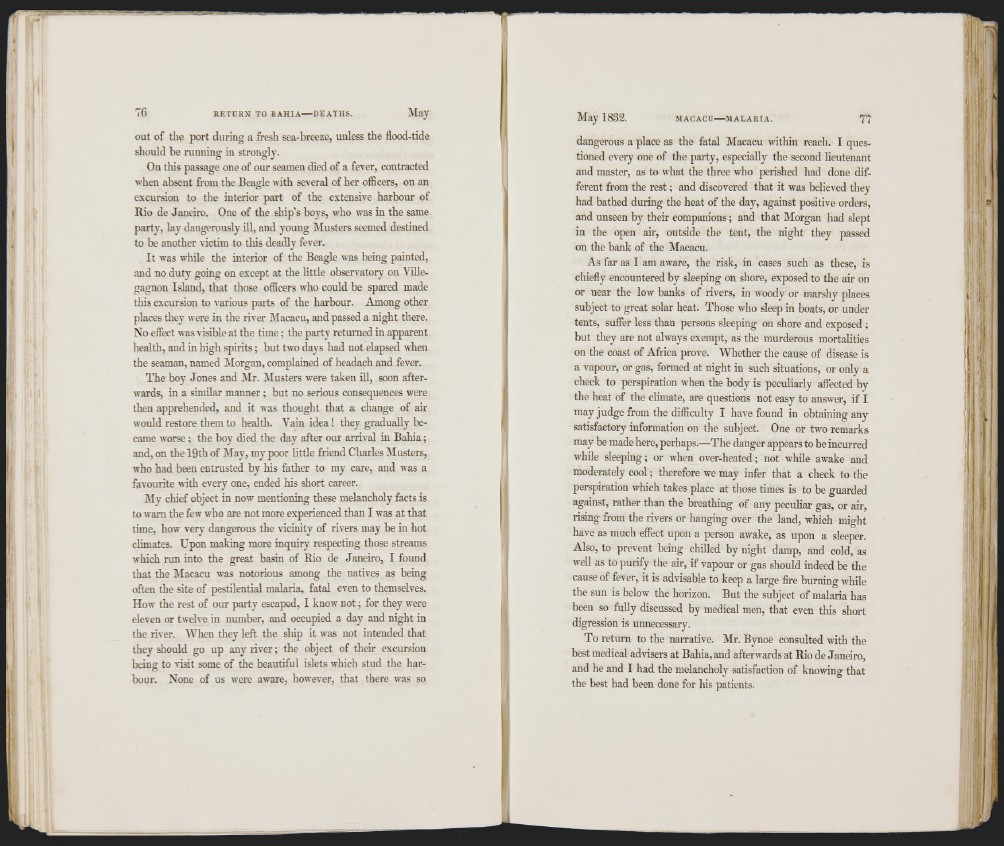
out of the port during a fresh sea-breeze, unless the flood-tide
should he running in strongly.
On tliis passage one of our seamen died of a fever, contracted
when absent from the Beagle with several of her officers, on an
excursion to the interior part of the extensive harbour of
Rio de Janeiro. One of the ship’s boys, who was in the same
party, lay dangerously ill, and young Musters seemed destined
to be another victim to this deadly fever.
I t was while tlie interior of the Beagle was being painted,
and no duty going on except at tlie httle observatory on Arille-
gagnon Island, that those officers who could be spared made
this excursion to various pai-ts of the harbour. Among other
places thej' were in the river Macacu, and passed a night there.
No effect was visible at the time; the party retui'ned in appai-ent
health, and in high spirits; but two da_ys had not elapsed when
the seaman, named IMorgan, complained of headach and fever.
The boy Jones and Mr. Musters ivere taken iU, soon afterwards,
in a similar manner ; hut no serious consequences were
then apprehended, and it was thought that a change of air
would restore them to health. Vain idea ! they gradually became
worse ; the boy died the day after our arrival in Baliia;
and, on the I9th of May, my poor little friend Charles Musters,
who had been entrusted by his father to my care, and w as a
favourite with every one, ended his short career.
My chief object in now mentioning these melancholy facts is
to warn the few who are not more experienced than I was at that
time, how very dangerous the vicinity of rivers may be in hot
climates. Upon making more inquiry respecting those streams
which run into the great basin of Rio de Janeiro, I found
that the Macacu was notorious among the natives as being
often the site of pestilential malaria, fatal even to themselves.
How the rest of our party escaped, I know' n o t; for they were
eleven or twelve in number, and occupied a day and night in
the river. When they left the sliip it was not intended that
they should go up any river; tlie object of their excursion
being to visit some of the beautiful islets which stud the harbour.
None of us were aware, however, that there was so
dangerous a place as the fatal Macacu wdthin reacli. I questioned
every one of the party, especially the second lieutenant
and master, as to what the three who perished had done different
from the re st; and discovered that it was believed they
had bathed during the heat of the day, against positive orders,
and unseen by their companions; and that Morgan Iiad slept
in the open air, outside the tent, the night they passed
on the bank of the Macacu.
As far as I am aware, the risk, in cases such as these, is
chiefly encountered by sleeping on shore, exposed to the air on
or near the low banks of rivers, in woody or mai-shy places
subject to great solar heat. Those who sleep in boats, or under
tents, suffer less than persons sleeping on shore and exposed ;
but they are not always exempt, as the murderous mortalities
on the coast of Africa prove. Whether the cause of disease is
a vapour, or gas, formed at night in such situations, or only a
check to perspiration when the body is peculiarly affected by
the heat of the climate, are questions not easy to answ'er, if I
may judge from the difficulty I have found in obtaining any
satisfactory information on the subject. One or tw'o remarks
may be made here, perhaps.—The danger appears to be incurred
while sleeping; or when over-heated; not while awake and
moderately cool; therefore we may infer that a check to the
perspiration which takes place at those times is to be guarded
against, rather than the breathing of any peculiar gas, or air,
rising from the rivers or hanging over the land, which might
have as much effect upon a person awake, as upon a sleeper.
Also, to prevent being chilled by night damp, and cold, as
weU as to purify the air, if vapour or gas should indeed be the
cause of fever, it is advisable to keep a large fire burning while
the sun is below the horizon. But the subject of malaria has
been so fully discussed by medical men, that even this short
digression is unnecessary.
To return to the nai-rative. Mr. Bynoe consulted with the
best medical advisers at Bahia, and afterwards at Rio de Janeiro,
and he and I had the melancholy satisfaction of knowing that
the best had been done for his patients.
i :i ‘